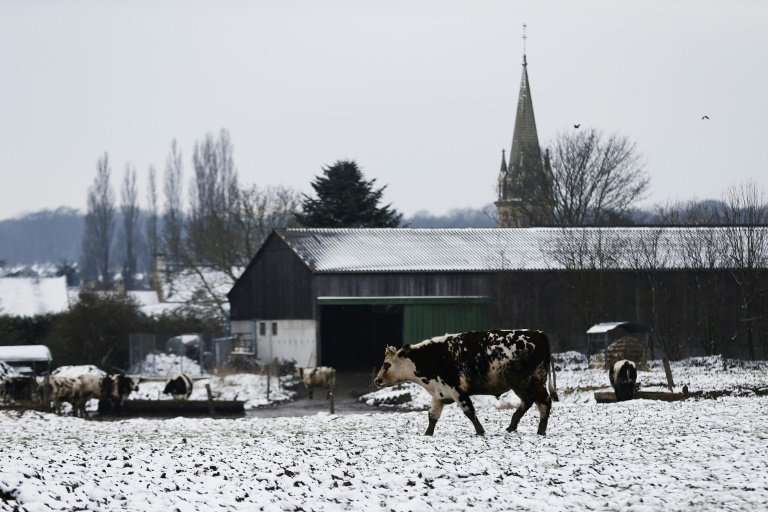Mark Rounsevell, a professor of sustainability points out it takes about 25 kilograms (55 pounds) of plant matter to produce one kilogram of beef; Cows are also major emitters of methane, a greenhouse gas that contributes to planet warming
Chicken or beef?
Think carefully: your choice can help determine the future of the planet.
After raising the alarm Friday about the fight for survival of many animal and plant species, which they lay at the door of mankind, scientists stressed we can still redeem ourselves.
And it doesn't have to be that hard.
"We don't all have to become vegetarians," said Robert Watson, an atmospheric scientist and head of the Intergovernmental Science-Policy Platform on Biodiversity and Ecosystem Services (IPBES), which brought out the first major global species assessment in 13 years.
"But a more balanced diet—less beef, more chicken, more vegetables... can really help relieve the pressure."
The IPBES reports, released at a major environmental conference in Medellin, are meant to guide governments in policymaking. But their authors stressed we all have a role to play.
When it comes to diet, for example, Mark Rounsevell, a professor of sustainability who co-authored one of the four IPBES reports, points out it takes about 25 kilograms (55 pounds) of plant matter to produce one kilogram of beef.
Cows are also major emitters of methane, a greenhouse gas that contributes to planet warming which the IPBES warned is now one of the major threats to biodiversity.
"Stop food waste," is Watson's next tip.
"Make sure you don't buy too much from the supermarket... Get restaurants to have appropriate amounts of food on the plate."
Waste not, want not
The clearing of land for farming is a major enemy of biodiversity, driving animals and plants from their habitats.
Yet an estimated 40 percent of all farmed food goes to waste, and predictions are we will have to double production to feed an exploding human population.
The four IPBES reports, covering the entire planet except for Antarctica and the open oceans, say irresponsible consumption by humans has driven species into decline in every region of the world.
But the stakes are higher than just preserving nature.
"We're undermining our own future well-being," said Watson.
Nature provides humans with food, clean water, energy, and regulates Earth's climate—just about everything we need to survive and thrive.
It's not too late to halt the rate of destruction, and maybe even reverse some of it, the experts concluded.
Governments must lead the way: expand protected areas, restore degraded land, lead the switch from polluting coal, oil, and natural gas to wind and solar power.
Biodiversity must find its way into all public policy, the reports said.
"At the moment we tend to have very siloed policy. We have agricultural policy, we have fisheries policy, we have manufacturing policy, transport policy. They're all very sectoral," said Rounsevell.
"We need to integrate concern for nature right across those different policies because we know that those different sectors have substantial influence on nature."
Bitter pill
Some changes will require tough choices.
"Get rid of the subsidies in agriculture, transportation and energy that only distort the economic system and lead quite often to unsustainability in a way we manage our biodiversity," said Watson.
Taxes may be needed, and goods might become more expensive.
Today, the "true cost" of producing many goods is not factored into their sales price, explained Rounsevell.
These include greenhouse gas emissions from raising cows, and the land area required to produce the fodder to feed them.
"Taxes is one way of embedding the costs that are not part of the direct market," said Rounsevell.
Jake Rice, who co-authored the Americas report, said the remedy for species decline may be a bitter pill for some.
"Yes, it will take fundamental changes in how we live as individuals, how we live as communities, and how we live as corporations," he said in Medellin.
"We keep making choices to borrow from the future to live well today. We do not need to make those choices. There are other options available. But they will require political will, individual will and foresight."
In the meantime, there is much that individuals can do.
Use fuel-efficient cars, or abandon them altogether for mass transportation, said Watson.
"Make sure you don't leave the lights on," he added.
"Make sure that your house is an energy efficient house... When you brush your teeth, turn the water off. Don't keep it running."
For another report author, Markus Fischer of the University of Bern in Switzerland, it is about the little things, the choices that everybody makes in their individual roles as consumers, citizens and decision-makers.
These "hundreds of thousands of decisions that we are taking" can be made in a way that's either "biodiversity friendly," or not, Fischer said.
"All these little decisions ... they make up the societal choice that we have and that is then driving our future."
© 2018 AFP
























